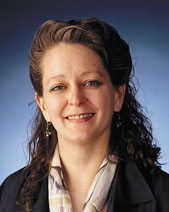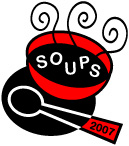SOUPS 2007 will include a Workshop on Usable IT Security Management
(USM'07) on July 18.
Scope and Focus
Having recently received increasing attention, usable security is
implicitly all about the end user who employs a computer system to
accomplish security-unrelated business or personal goals. However,
there is another aspect to usable security. IT professionals have to
deal with the order of magnitude more difficult problem of managing
security of large, complex enterprise systems, where an error could
cost a fortune. IT security is distributed amongst various
individuals and tools within the organization making the support IT
security management tasks hard. The diversity of the tasks also
contributes to the complexity of the issues:
- analysis of security and privacy regulations, requirements, and
liabilities
- management of security and privacy policies
- design of security controls and procedures
- deployment, integration, modification, and maintenance of security
solutions
- security configuration and monitoring of devices, systems, and
applications
- collection, visualization, and analysis of security information
- detection, reporting, response to, investigation of, and recovery
from security incidents
- management of user accounts and rights
- compliance with regulations
- patch management
Are the notions of usable security for end-users and IT
professionals the same? What is unique about IT security management,
and why should HCISec community care? What are the differences in
the background, training, goals, tasks, constraints, and tools
between end-users, IT security professionals, and other IT staff
(e.g., network admins)? How do these differences affect the
(perception of) usability of the security mechanisms and tools? Can
the approaches to improving the security usability for end-users be
directly applied to the domain of IT security management, and vice
versa? With some of the modern-day systems, where users are largely
responsible for their own security self-administration, where is the
boundary between the end-users, power users, and IT security
professionals? Can it be defined precisely or is it blurred?
USM'07 solicits short position papers from academia and
industry about all aspects of IT security management usability. The
workshop will provide an opportunity for interdisciplinary
researchers and practitioners to discuss this fascinating and
important topic. Those interested in presenting at the workshop
should submit a position paper of up to four pages along with a
cover letter describing their research interests, experience, and
background in the area of usable IT security management. Workshop
papers will be posted on the SOUPS website and distributed to
attendees on the SOUPS 2007 CD. However, workshop papers will not be formally
published, and therefore may include work the authors plan to
publish elsewhere.
Submissions
The workshop solicits position papers from academia and industry
about all aspects of IT security management usability. Papers may be
up to 4 pages in length including bibliography, appendices, and
figures, using the ACM SIG proceedings template at
http://www.acm.org/sigs/pubs/proceed/template.html (LaTeX users
should use template Option 2). All submissions must be in PDF format
and should not be blinded.
Submit your paper using the electronic submissions page for the
SOUPS 2007 conference. A successful submission will display a web
page confirming it, and a confirmation email is sent to the
corresponding author. Please make sure you receive that confirmation
email when you submit, and follow the directions in that email if
you require any follow up.
Paper submissions will close at 11 PM of April 13. Authors will be
notified of acceptance by May 11, and camera ready final versions of
the papers will be due June 5.
Program
9:00 - 9:05 Introductions and logistics -
Konstantin Beznosov and John Karat, workshop organizers
9:10 - 9:55 Opening session
9:55 - 10:15 Presentations
- Observations on the topic of usability within security management
John Karat
- Myths and reality of IT security management
Konstantin Beznosov
10:15 - 10:45 Break
10:45 am - 12:00 IT Security Viewpoints
12:00 - 1:00 pm: Lunch
1:00 - 2:15 IT Security Management: In Small and At Large
2:15 - 2:30 Break
2:30 - 3:15 Implications for Designing Usable IT Security
Management Tools
INVITED TALK
Sioux Fleming - The New Challenges Malware Attacks Present to IT
Security staff
 How is IT security with respect to malware different from other IT tasks
and what challenges does this pose? Malware outbreaks are nothing new
to IT security staff, but recent changes in the ways malware is
propagated as well as the motivation for this propagation have changed
the situation. For IT security, this means determining when automated
outbreak response systems are sufficient and when additional measures
are required to prevent major disruptions to business continuity or
security breaches. Network perimeter security, email, Internet use,
user rights, password policies, software updates and physical security
all play a role in determining whether or not malware can enter and
spread, and each is often handled by different IT group or department.
The amount of information coming in all these systems can be
overwhelming, even if centralized security information management tools
are in place. When developing security information systems and
strategies to handle such threats, what groups in IT need to be
involved? This talk will give real-world examples of outbreaks at large
corporations and discuss what security information is needed to develop
an efficient IT security strategy to prevent them.
How is IT security with respect to malware different from other IT tasks
and what challenges does this pose? Malware outbreaks are nothing new
to IT security staff, but recent changes in the ways malware is
propagated as well as the motivation for this propagation have changed
the situation. For IT security, this means determining when automated
outbreak response systems are sufficient and when additional measures
are required to prevent major disruptions to business continuity or
security breaches. Network perimeter security, email, Internet use,
user rights, password policies, software updates and physical security
all play a role in determining whether or not malware can enter and
spread, and each is often handled by different IT group or department.
The amount of information coming in all these systems can be
overwhelming, even if centralized security information management tools
are in place. When developing security information systems and
strategies to handle such threats, what groups in IT need to be
involved? This talk will give real-world examples of outbreaks at large
corporations and discuss what security information is needed to develop
an efficient IT security strategy to prevent them.
Sioux Fleming is a director of product management for eTrust security
management at CA, responsible for enterprise threat management
evangelism. She joined CA as part of its acquisition of PestPatrol,
where she served as group product manager. Sioux has a wide range of
experience in the security tools industry, including antivirus and
encryption security in addition to anti-spyware. She also has prior
experience in the software industry in media asset management tools,
enterprise PC migration tools and other system utilities at companies
such as Central Point Software and Symantec. Sioux holds a bachelor of
science degree in physics from Lewis and Clark College in Portland,
Oregon.
SOUPS is sponsored by Carnegie Mellon CyLab.
